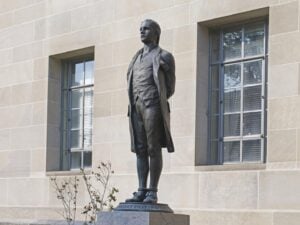It's Time to Fire the Federal Middleman
If you want something done in your community, would it ever occur to you to send a check to Washington, D.C., first, so that the federal bureaucracy could take a cut before sending back the rest?
Welcome to the new world of “block grants”—the latest fashion that has Congress and state legislatures buzzing. The motivation is commendable: reduce federal micromanagement and allow states to innovate by giving them large dollops of federal money with few strings attached. In place of failed, one-size-fits-all programs run rigidly by Washington, the states would function as 50 “laboratories,” generating new approaches that would work better because states are closer to the people. Congress, before the year is out, may reorganize and consolidate many federal programs this way–from welfare to crime control.
The block grant idea per se is not really new, but now the Congress is moving toward implementing it in a massive way. Less than 20 percent of the $200 billion Washington sends back to the states now goes in the form of block grants, and all of that went for operating or capital expenses for local or regional projects. The congressional leadership now wants to take the next step and convert “entitlement” programs into block grants. These are programs whose spending requirements are determined not by some fixed appropriation the Congress decides it wants to make, but by the “needs” of those whom the law says are “entitled” to the cash. Welfare-state proponents argue that without an automatic entitlement written into the law, the amount the federal government sends to the states may prove insufficient to meet the “needs” of all the people who qualify for the programs.
The states respond by saying, “Give us the money without all the expensive and ridiculous mandates and rules and we’ll make enough savings to do at least as good a job for even less money.” All other things equal, they’re probably right, but that’s not the end of the story.
If less federal meddling in how programs are locally run is the primary objective of the block-grant approach, it may be easy to achieve at the start but difficult to sustain. As the old saying goes, “He who pays the piper calls the tune.” Congress will always be tempted to add conditions and clarifications each time appropriations bills containing block grants come up. It is not hard to imagine state and local officials complaining, a few years from now, “Where did all these strings come from?”
The truth is that block grants would do little to address the inherent flaws in our current system of multi-layered bureaucratic structures. Laundering the people’s money through two or three levels of government is a make-work scheme for administrators. One study showed that, of the $226 billion spent by federal, state, and local governments on welfare in 1990, only 35 cents of every dollar ever made it into the hands of the poor. On the farm, that’s called feeding the sparrows through the horses.
Furthermore, block grants would actually reduce the accountability of government because they separate the raiser of the tax revenue (the federal government) from the spender of it (state and local governments). If something goes awry, Washington will blame the states for not spending the money wisely, and the states will blame Washington for not providing enough money to do the job. Taxpayers and users of government services will be left wondering who is responsible for what.
It is generally true that because states and municipalities are closer to the people than the federal government, they are more accountable and responsive to individual citizens and local concerns—as long as they are spending local money. Not even the most diligent of local politicians, however, will spend money from Washington as carefully as they spend what they are accountable for raising themselves.
Some of us in Michigan learned that lesson years ago. In the late 1980s, one township with no downtown accepted federal block grant funds earmarked for “downtown revitalization.” The money went for a parking lot at the township hall. The same officials accepted another block grant to construct “barrier-free improvements” on the same site, but used the money not to assist the handicapped so much as to enhance their own work environments. Fifteen of the 23 block-grant programs enacted by Congress since 1966 are still on the books, shoveling out $35 billion yearly and raising plenty of questions about their wisdom in the process. What makes Washington think that federal welfare for state and local governments can work any better than federal welfare for individuals?
In the 1980s, Congress debated a less half-hearted reform known as “turnbacks.” Under that idea, the federal government turns back to state and local governments both the spending responsibility for programs now run from Washington and the revenue sources, too. Instead of “We’ll raise it and you spend it,” with turnbacks Washington says, “You raise it and you spend it.”
Economist Dean Stansel of the Cato Institute points out, for example, that the Reagan administration once proposed ending federal responsibility for highways and repealing federal gasoline taxes, giving states the option of raising their own gas taxes. It wasn’t enacted, but if it had been, states like mine would not be sending nearly twice as much gas tax money to Washington as it gets back each year.
Of course, even the turnback idea assumes from the start that transferring a program from one government to another–federal to state, primarily–is the ultimate reform. We ought to be raising more fundamental questions with regard to everything the federal government does: Is this a legitimate function of any government? Why should this activity be coercively funded at all? Would it be more in accord with the principles of individual liberty and sound economics to leave this activity to the willing participation of free people who choose to conduct it on their own?
If Congress is serious about putting an end to the billion-dollar paper blizzard that afflicts federal programs, and restoring accountability to our system of government, block grants are not the answer. Firing the federal middleman is. Once we do that, let’s give a lot of thought to why we would want a state or local middleman before we authorize any level of government to take our money.




